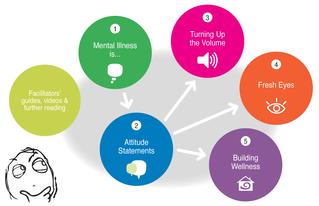Resources
New Zealand Research
This page provides links to a number of systematic reviews and research studies that has been undertaken in the field of Youth Mentoring in New Zealand. These include:
- Examing the Cultural Context of Youth Mentoring: A systematic review
- The Effectiveness of Youth Mentoring Programmes in New Zealand: A systematic review
- Important Nonparental Adults as an Academic Resource for Youth
The page also includes links to some useful resources programmes and mentors may find useful in their work with young people, including:
- The Conversations for Change resource has been created by Mind and Body Consultants, as part of the Like Minds, Like Mine programme which is managed by the Health Promotions Agency (HPA).
-
Fun activities to bring to your mentoring sessions, developed by the University of Auckland and the Great Potentials Foundation
Examining the Cultural Context of Youth Mentoring: A systematic review
Farruggia, S.P., Bullen, P., Solomon, F., Collins, E. & Dunphy, A. (2011). Journal of Primary Prevention, 32, 237-251. doi:10.1007/s10935-011-0258-4
 Download as a PDF
Download as a PDF
Abstract: While research in youth mentoring is extensive in the U.S., little research has explored its effectiveness in New Zealand, despite its growth in the past 20 years. While arguments have been raised that overseas models may not fit all cultural contexts within New Zealand, there appears to be limited evidence supporting this contention. Further, little is known about associations between effectiveness and the cultural appropriateness of programs and research. This systematic review of youth mentoring programs in New Zealand is based on 26 studies that met inclusion criteria. Of those, 14 had a significant proportion (15% or more) of indigenous Māori youth and six had a significant proportion of Pasifika (Pacific Islander) youth. While almost all programs and associated research were culturally appropriate to the overall New Zealand context, they tended to be less culturally appropriate for programs working with Māori and Pasifika youth. Further, there was a negative association between cultural appropriateness and program effectiveness.
The Effectiveness of Youth Mentoring Programmes in New Zealand: A systematic review
Farruggia, S.P., Bullen, P., Davidson, J., Dunphy, A., Solomon, F., & Collins, E. 2011). New Zealand Journal of Psychology, 40 (3), 52-70.
 Download as a PDF
Download as a PDF
Abstract: This systematic review examines the effectiveness of youth mentoring programmes in New Zealand, an area that has had tremendous growth in the past 20 years. Of the 74 potential studies identified in searches, 26 met the inclusion criteria. Overall, 88% of the included programmes showed some level of effectiveness, although these results are tentative due to the varied quality of the research. Further, programmes that focused on psychological and interpersonal goals were more effective than programmes focused on educational, behavioural, vocational or cultural goals. Programme characteristics that appeared to moderate effectiveness included: dissemination, age of programme, history of evaluation, utilising principles of best practice, component programme, type of mentoring relationship, use of peers as mentors, level of structure, expected length of mentor-mentee relationship, SES of youth, and researcher-practitioner relationship.
Important Nonparental Adults as an Academic Resource for Youth: Natural Mentoring Research
Farruggia, S.P., Bullen, P., & Davidson, J. (2013). Journal of Early Adolescence, 33, 498-522. doi: 10.1177/0272431612450950
Link for more information
Abstract: This study examined the associations between various sources of social support and academic achievement. Participants were 313 ethnically diverse students attending a low-income intermediate school in New Zealand (mean age = 11.96 years). They reported on the presence and nature of a relationship with a very important nonparental adult in their lives (VIP), and on parent, peer, and VIP warmth and acceptance. Indicators of academic achievement (standardized tests) were also gathered from the school. Results showed that 62% of the youth reported the presence of at least one VIP in their lives, and there was a significant, positive correlation between VIP presence and the majority of academic achievement variables. VIP warmth was uniquely associated with all achievement variables, while parent and peer warmth were nonsignificant in the presence of VIP warmth. The results indicate that VIPs are an important resource for youth who are at risk of low achievement.
Conversations for Change - free resource for those who work with young people

The Conversations for Change resource has been created by Mind and Body Consultants, as part of the Like Minds, Like Mine programme which is managed by the Health Promotions Agency (HPA).
It is designed to reduce stigma and discrimination connected to mental distress and to increase social inclusion.
It contains comprehensive facilitator's guides to five group activities which challenge stigma and discrimination, and generate safe conversations about mental distress.
The resource aims to encourage young people to reach out for support, and to include and support each other. The activities are creative, lively, and easy to implement.
All resources are fully downloadable at rethink.org.nz/Conversationsforchange
Youth Mentoring Resources - fun activities to bring to your mentoring sessions
When you are stuck for an idea on what to do with your mentee (young person) at your next meeting then this repository of activities is a great place to start. It covers a wide range of areas including: communication; relationship building; positive attitude and identity; culture and diversity and academic support. Thank you to the University of Auckland, the Great Potentials Foundation and the Vodafone Foundation for making this repository of activities freely available for everyone to use in their mentoring sessions.
Click on the following link to access these activities: http://www.education.auckland.ac.nz/en/for/current-students/facilities-and-resources/youth-mentoring-resources.html

